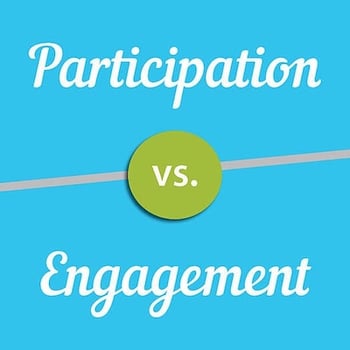 When it comes to your employee wellness program, participation and engagement are not the same thing. It’s important to distinguish between the two because the first might boost numbers, but the second will ultimately determine your success.
When it comes to your employee wellness program, participation and engagement are not the same thing. It’s important to distinguish between the two because the first might boost numbers, but the second will ultimately determine your success.
At first glance, participation and engagement in a corporate wellness program might seem to describe the same thing. The difference is in an employee’s mindset. Participation is simply taking action, while engagement is making an investment.
Participation, Taking Action
Employees who simply participate will likely:
- Sign up for the program
- Fill out the necessary forms and paperwork
- Complete a standard HRA or screening
- Go through the motions of the program requirements without much focus or effort
- Avoid doing anything extra or outside of work to improve their health
Engagement, Making an Investment
Employees who are engaged in your wellness program will do the logistical requirements to be part of the program, but will also probably:
- Set individual goals for themselves
- Take part in the extra or optional wellness activities you promote
- Continue a healthy lifestyle outside of the workplace
- Ultimately, see results and become a happier, healthier person
- You’ll see this in their increased productivity, improved quality of work, and decreased use of sick days!
Clearly, engagement is what you should strive for in your wellness program. In order to truly see results and improve the health of your workforce, you need employees who will invest in themselves rather than check boxes and go through the motions.
We do realize that maximizing engagement is easier said than done. It’s always important to work with your employees to see what they want and need from a wellness program. Here are some ideas you can use to brainstorm and build an engaging employee wellness program.
Set Goals
There are a few ways to set and tackle goals in a wellness program. You can look at your aggregate data and set team goals, or you can work with your employees to set individual goals. Either way, it’s important to develop specific, achievable goals. You could also display the goals publicly in the office to keep them on everyone’s minds as they go about their days.
Reward Improvement
Incentives are on the rise in corporate wellness programs. If you offer or are considering incentives, be intentional about what you incentivize. For example, rather than offering your incentive for signing up, you could offer the reward for setting or reaching a wellness goal. This way, people will put in the time and effort it takes to make positive, healthy changes in their lives.
Recognize Milestones
Many companies have an internal newsletter, announcement board or memo system to spread news throughout the office. What better news to spread than successful wellness stories?! Recognizing your employees’ successes is a simple way to show you care about and acknowledge the investments they’ve made in their health.
Focus on Engagement
This idea is so simple, it just might work! Rather than trying to boost your participation numbers, try promoting engagement specifically. When you talk about your wellness program, talk about results, goals and actionable things people can do to improve their health. Avoid focusing your messages on the signup process, paperwork or minimum requirements to be involved.
Lead By Example
Sometimes the best way to promote health is by showing others that it is possible to lead a healthy lifestyle. If you become truly engaged in your employee wellness program, others will see the benefits. This “lead by example” style can spread like wildfire, and is a great foundation for a support system focused on achieving goals and becoming healthier individuals.
Ideally, every employee will invest in his or her health and truly engage with your program. Reaching this ultimate goal of an engaged workforce doesn’t have to be a shot in the dark. Try to focus on these important areas when you promote your wellness program, so your employees can step away from “taking action,” and step towards “investing in themselves.”
What kind of wellness activities do you use to promote employee engagement??



